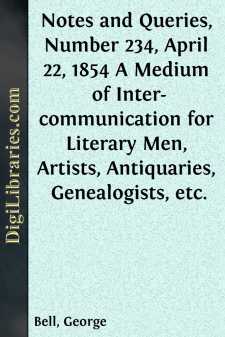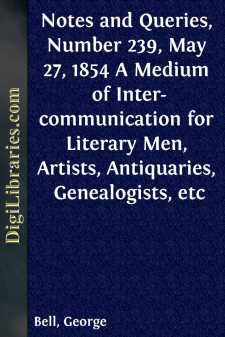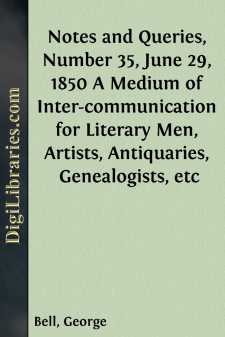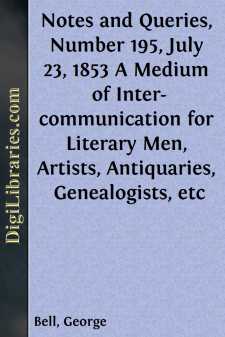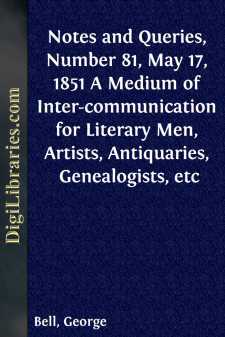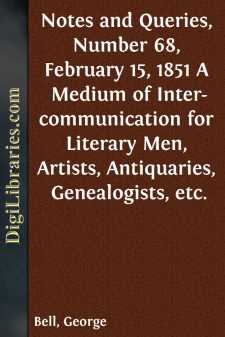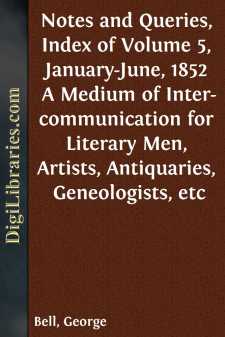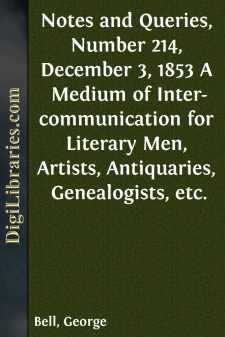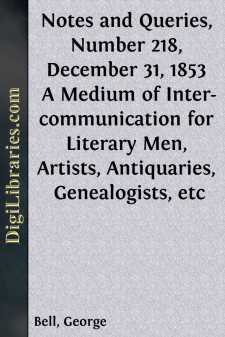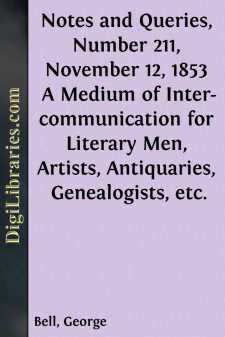Categories
- Antiques & Collectibles 13
- Architecture 36
- Art 48
- Bibles 22
- Biography & Autobiography 813
- Body, Mind & Spirit 142
- Business & Economics 28
- Children's Books 17
- Children's Fiction 14
- Computers 4
- Cooking 94
- Crafts & Hobbies 4
- Drama 346
- Education 46
- Family & Relationships 57
- Fiction 11829
- Games 19
- Gardening 17
- Health & Fitness 34
- History 1377
- House & Home 1
- Humor 147
- Juvenile Fiction 1873
- Juvenile Nonfiction 202
- Language Arts & Disciplines 88
- Law 16
- Literary Collections 686
- Literary Criticism 179
- Mathematics 13
- Medical 41
- Music 40
- Nature 179
- Non-Classifiable 1768
- Performing Arts 7
- Periodicals 1453
- Philosophy 64
- Photography 2
- Poetry 896
- Political Science 203
- Psychology 42
- Reference 154
- Religion 513
- Science 126
- Self-Help 84
- Social Science 81
- Sports & Recreation 34
- Study Aids 3
- Technology & Engineering 59
- Transportation 23
- Travel 463
- True Crime 29
Sort by:
by:
George Bell
Minor Notes. Tippet.—The origin of words signifying articles of dress would be a curious subject for investigation. Tippet is derived by Barclay from the Saxon tæppet; but I find the following passage in Captain Erskine's Journal of his recent Cruise in the Western Pacific, p. 36. He is writing of the dress of the women at the village of Feleasan, in the Samoan Islands: "And occasionally a...
more...
by:
George Bell
REPRINTS OF EARLY BIBLES. In 1833 the authorities of the Clarendon Press put forth a quarto reprint, word for word, page for page, and letter for letter, of the first large black-letter folio edition of 1611, of the present authorised or Royal version of the Bible. So accurate was it, that even manifest errors of the press were retained. It was published that the reader might judge whether the original...
more...
by:
George Bell
GEORGE GORING, EARL OF NORWICH, AND HIS SON GEORGE, LORD GORING. G.'s inquiry (Vol. i., p. 22.) about the two Gorings of the Civil War—a period of our history in which I am much interested—has led me to look into some of the sources of original information for that time, in the hope that I might be enabled to answer his Queries. I regret I cannot yet answer his precise questions, when Lord...
more...
by:
George Bell
WILLIAM BLAKE. My antiquarian tendencies bring me acquainted with many neglected and obscure individuals connected with our earlier English literature, who, after "fretting their hour" upon life's stage, have passed away; leaving their names entombed upon the title-page of some unappreciated or crotchetty book, only to be found upon the shelves of the curious. To look for these in Kippis,...
more...
by:
George Bell
Notes. ILLUSTRATIONS OF CHAUCER, NO. VI. Unless Chaucer had intended to mark with particular exactness the day of the journey to Canterbury, he would not have taken such unusual precautions to protect his text from ignorant or careless transcribers. We find him not only recording the altitudes of the sun, at different hours, in words; but also corroborating those words by associating them with physical...
more...
by:
George Bell
DEFENCE OF THE EXECUTION OF MARY QUEEN OF SCOTS. Allow me to supply a deficiency in my last volume of Extracts from the Registers of the Stationers' Company, printed by the Shakspeare Society. It occurs at p. 224., in reference to an entry of 11th Feb., 1587, in the following terms: "John Wyndett. Lycensed alsoe to him, under the B. of London hand and Mr. Denham, An Analogie or Resemblance...
more...
by:
George Bell
No description available
by:
George Bell
PETER BRETT. Your correspondent T. K. seems to think that Scotchmen, and Scotch subjects, have an undue prominence in "N. & Q.:" let me therefore introduce to your readers a neglected Irishman, in the person of Peter Brett, the "parish clerk and schoolmaster of Castle-Knock." This worthy seems to have been a great author, and the literary oracle of the district over which he...
more...
by:
George Bell
Minor Notes. Italian-English (Vol. viii., p. 436.).—The following wholesale assassination of the English language was perpetrated in the form of a circular, and distributed among the British residents at Naples in 1832: "Joseph the Cook, he offer to one illuminated public and most particular for British knowing men in general one remarkable, pretty, famous, and splendid collection of old goods,...
more...
by:
George Bell
NOTES ON GRAMMONT. Agreeing with Mr. Peter Cunningham (vide History of Nell Gwyn), that a new edition of Grammont is much wanted, I beg to avail myself of your pages, and to offer a few remarks and notes which I have made in reference to that very entertaining work for the consideration of a future annotator. Of the several maids of honour mentioned therein I will begin with those of the queen. They...
more...


